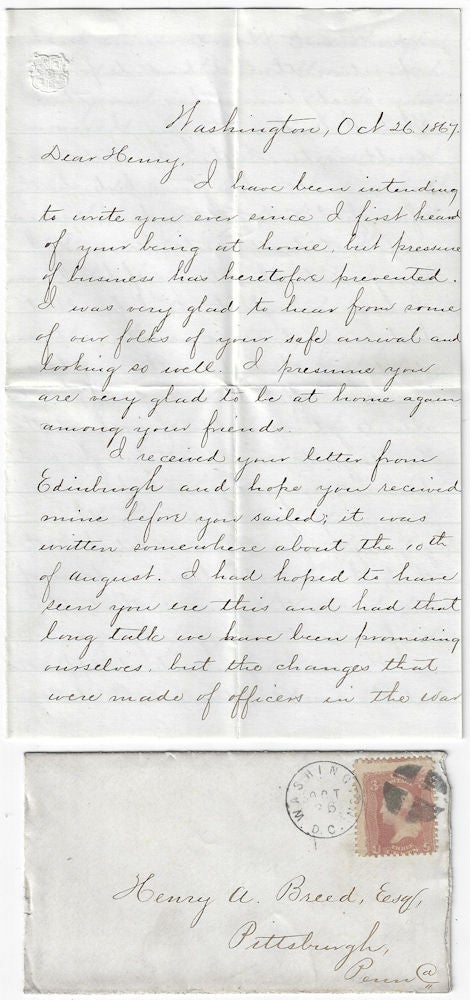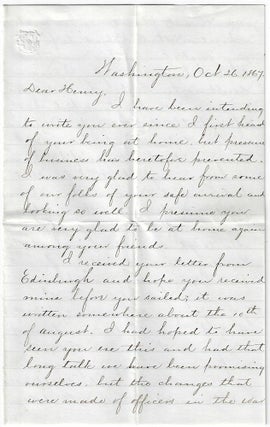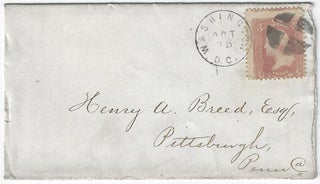1867 – A letter from an officer in the War Department describing the turmoil caused by President Johnson’s firing of Secretary of War Edwin Stanton and appointment of General Grant to temporarily fill the position, an act which led to his impeachment by Radical Republicans in the House of Representatives.
Washington, DC: 1867. Envelope or Cover.
This four-page letter from William Atwood in Washington, DC to a family member in Pittsburgh is dated October 26, 1867. Its mailing envelope is franked with a 3-cent stamp (Scott #65) canceled with a cork ‘killer’ and bearing a circular Washington, DC postmark. In nice shape. A transcript will be provided.
Atwood’s letter reads in part:
“I have been intending to write you . . . but pressures of business here heretofore prevented. . .. The changes that were made of officers in the War Department placed me in such a position that I had to forego any visit home this month. . .. Colonel Wood was relieved and sent to Atlanta, GA, [I was] assigned to the charge of his Bureau. . .. It is as much as I can do to get through with my business in office hours.
“I was very much disappointed at the result of the recent elections but think it will have the effect of stirring the Republicans up to a grand victory in the Presidential contest. Grant will be our candidate, and a “tower of strength” he will prove too. I had a talk with Gov. Boutwell last week about ‘the situation’ generally. He seems to think that the impeachment scheme will be pushed immediately upon the assembling of Congress and that a majority of the House will favor it. He doesn’t feel at all discouraged about the elections. My impression is that the President is going to head a moderate party in the Constitutional amendment, and mission of loyal white representatives from the Southern States and opposition to negro suffrage as the principal planks in its platform.
“We have many rumors about a successor to General Grant in the War Dept, the latest person named in that connection being Gov. Andrews of Mass. I like Grant very much as Sec of War and would be very sorry to see anyone else in his place unless it is Mr Stanton.”
. Very good. Item #010044Following the surrender of the Confederacy, President Johnson began to ‘reconstruct’ the South along the lenient and forgiving line espoused by President Lincoln before his assassination. This enraged many Congressional Northerners, who dominated the body immediately following the war. They demanded draconian punishments be placed upon white Southerners. Further enraging them, Johnson vetoed their Civil Rights Act of 1866 noting:
“In all our history. . . no such system as that contemplated by the details of this bill has ever before been proposed or adopted. [They] go indefinitely beyond any . . . ever provided for the white race, [and are] made to operate in favor of the colored against the white race. They interfere with the municipal legislation of the States; with relations existing exclusively between a State and its citizens, or between inhabitants of the same State; an absorption and assumption of power [that will] destroy our federative system of limited power. . ..”
After, the Radical Republicans retained control of Congress following the 1866 elections, they voiced support for the ‘military dictatorship’ over the South imposed by the Freedman’s Bureau director, General O. O. Howard, who bragged that “almost unlimited authority gave me scope and liberty of action... Legislative, judicial and executive powers were combined in my commission.” Further, they passed the patently unconstitutional Tenure of Office Act, which had been concocted by George S. Boutwell, a representative from Massachusetts, in concert with Secretary of War Stanton, to prevent Johnson from firing their allies in the Executive Branch.
Johnson ignored the act and dismissed Stanton, under whom Howard served, and temporarily appointed Ulysses S. Grant to assume the position while he continued to serve as General of the Army. Enraged, the Radical Republicans immediately initiated their previous conceived plan to impeach which Boutwell led from his seat in the House of Representatives. After his dismissal, Stanton barricaded himself in his office until the Senate voted not to convict Johnson on the impeachment charge.
Johnson’s temporary appointment of Grant as the Secretary of War placed booth the general and his subordinates in a legal quandary, and Grant eventually resigned fearing possible retaliatory punitive legal action by the Radical Republicans. Upon his resignation, Johnson appointed Major General Lorenzo Thomas, who Stanton ordered cronies arrest for ‘illegally seizing’ the Secretary position. However, quickly upon reflection, Stanton retracted his action, realizing that if Thomas was brought to trial, the house of cards surrounding the Tenure of Office Act would tumble.
After the impeachment attempt failed, Johnson completed his term of office. Returning to his home state of Tennessee was elected as a Senator in 1868; he died three months into his term. Stanton returned to his private law practice until he was nominated to the Supreme Court by General Grant in 1869; he died before taking office.
(For more information, see “The Impeachment of Andrew Johnson” at the HarpWeek website and “Impeachment Trial of President Andrew Johnson, 1868” at the U. S. Senate website.)
An important first-hand, ground-level view of the Stanton-Johnson conflict that directly led to the president’s impeachment from an ambivalent junior officer serving right in the middle of the chaos.
Exceptionally scarce. At the time of listing, there are no similar items for sale in the trade. The Rare Book Hub identifies no similar items having ever appeared at auction. OCLC identifies no institutions holding similar items.
.Price: $750.00








